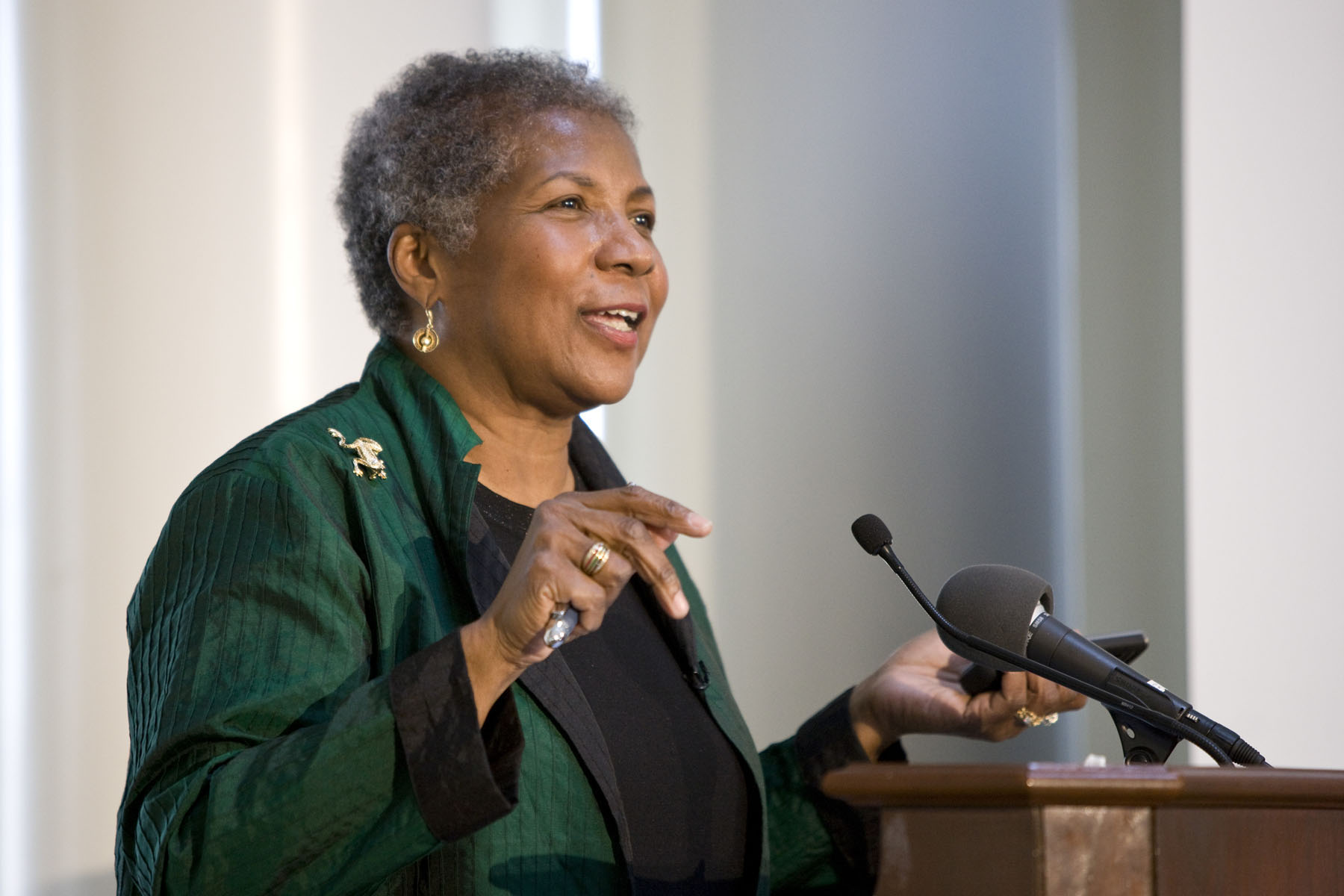February 24, 2009 — A capacity crowd filled the Dome Room of the Rotunda Monday afternoon to hear Margaret Beale Spencer, Marshall Field IV Professor of Urban Education at the University of Chicago, deliver the annual Walter N. Ridley Distinguished Lecture.
The annual lecture series, sponsored by the Curry School of Education's Ridley Scholarship Fund, is held in memory of the first African-American to graduate from the University of Virginia. When he earned his Ph.D. from the Curry School in June 1953, Walter N. Ridley became the first African-American to graduate from U.Va. and the first to receive a doctorate from a white Southern university.
Spencer's lecture highlighted the U.S. Supreme Court's landmark 1954 Brown v. Board of Education decision and its relevance to current challenges in education. Spencer prefaced her remarks by acknowledging the courage of Ridley in petitioning U.Va. for admission. She described the bravery of Ridley and others like him as building the foundation for the election of Barack Obama as the first African-American president.
Spencer's main message was clear: educators and citizens must move from solely focusing on individual disadvantaged children and their families, and begin to examine what might be occurring in our society and in the schools that prevents minority and low-income children from succeeding academically.
"We must understand the 'how' and 'why' questions," Spencer said.
In a separate interview, Stanley Trent, Curry's assistant dean of diversity and equity, elaborated on Spencer's comments. "Traditionally, school failure among culturally, linguistically and economically disadvantaged children has been relegated to deficits that reside within them, their families and communities," he said. "Spencer elucidates the need to acknowledge the variation within these groups and to consider factors in schools that can contribute to school failure and/or success."
The lecture was shown on live video feed to an overflow crowd in the Rotunda's Lower West Oval Room, in addition to several classrooms in the Curry School's Ruffner Hall.
Some faculty incorporated the lecture into their syllabi, asking students to reflect on the challenges Spencer posed as they relate to a variety of elements in education. A reading of Spencer's work was provided to students ahead of time. A collaborative Web site featured Spencer's bio, teaching tips for faculty, and a blog was established prior to the lecture and is being utilized for continued discussion of the topic after the lecture.
"Professor Spencer was selected as this year's speaker based on her commitment to equity in education for all learners as demonstrated in their scholarship and/or practice," Trent said.
Past Ridley Lecturers include Henry L. Johnson, former U.S. assistant secretary for elementary and secondary education; Jacqueline Jordan Irvine, Charles Howard Candler Professor of Urban Education at Emory University; and James Banks, director of the Center for Multicultural Education at the University of Washington.
In addition to the Ridley Lecture, the Curry School will host the annual Symposium on Race and Society Nov. 5-7.
The annual lecture series, sponsored by the Curry School of Education's Ridley Scholarship Fund, is held in memory of the first African-American to graduate from the University of Virginia. When he earned his Ph.D. from the Curry School in June 1953, Walter N. Ridley became the first African-American to graduate from U.Va. and the first to receive a doctorate from a white Southern university.
Spencer's lecture highlighted the U.S. Supreme Court's landmark 1954 Brown v. Board of Education decision and its relevance to current challenges in education. Spencer prefaced her remarks by acknowledging the courage of Ridley in petitioning U.Va. for admission. She described the bravery of Ridley and others like him as building the foundation for the election of Barack Obama as the first African-American president.
Spencer's main message was clear: educators and citizens must move from solely focusing on individual disadvantaged children and their families, and begin to examine what might be occurring in our society and in the schools that prevents minority and low-income children from succeeding academically.
"We must understand the 'how' and 'why' questions," Spencer said.
In a separate interview, Stanley Trent, Curry's assistant dean of diversity and equity, elaborated on Spencer's comments. "Traditionally, school failure among culturally, linguistically and economically disadvantaged children has been relegated to deficits that reside within them, their families and communities," he said. "Spencer elucidates the need to acknowledge the variation within these groups and to consider factors in schools that can contribute to school failure and/or success."
The lecture was shown on live video feed to an overflow crowd in the Rotunda's Lower West Oval Room, in addition to several classrooms in the Curry School's Ruffner Hall.
Some faculty incorporated the lecture into their syllabi, asking students to reflect on the challenges Spencer posed as they relate to a variety of elements in education. A reading of Spencer's work was provided to students ahead of time. A collaborative Web site featured Spencer's bio, teaching tips for faculty, and a blog was established prior to the lecture and is being utilized for continued discussion of the topic after the lecture.
"Professor Spencer was selected as this year's speaker based on her commitment to equity in education for all learners as demonstrated in their scholarship and/or practice," Trent said.
Past Ridley Lecturers include Henry L. Johnson, former U.S. assistant secretary for elementary and secondary education; Jacqueline Jordan Irvine, Charles Howard Candler Professor of Urban Education at Emory University; and James Banks, director of the Center for Multicultural Education at the University of Washington.
In addition to the Ridley Lecture, the Curry School will host the annual Symposium on Race and Society Nov. 5-7.
Media Contact
Article Information
February 24, 2009
/content/ridley-lecturer-calls-systemic-examination-educational-struggles-disadvantaged-children

